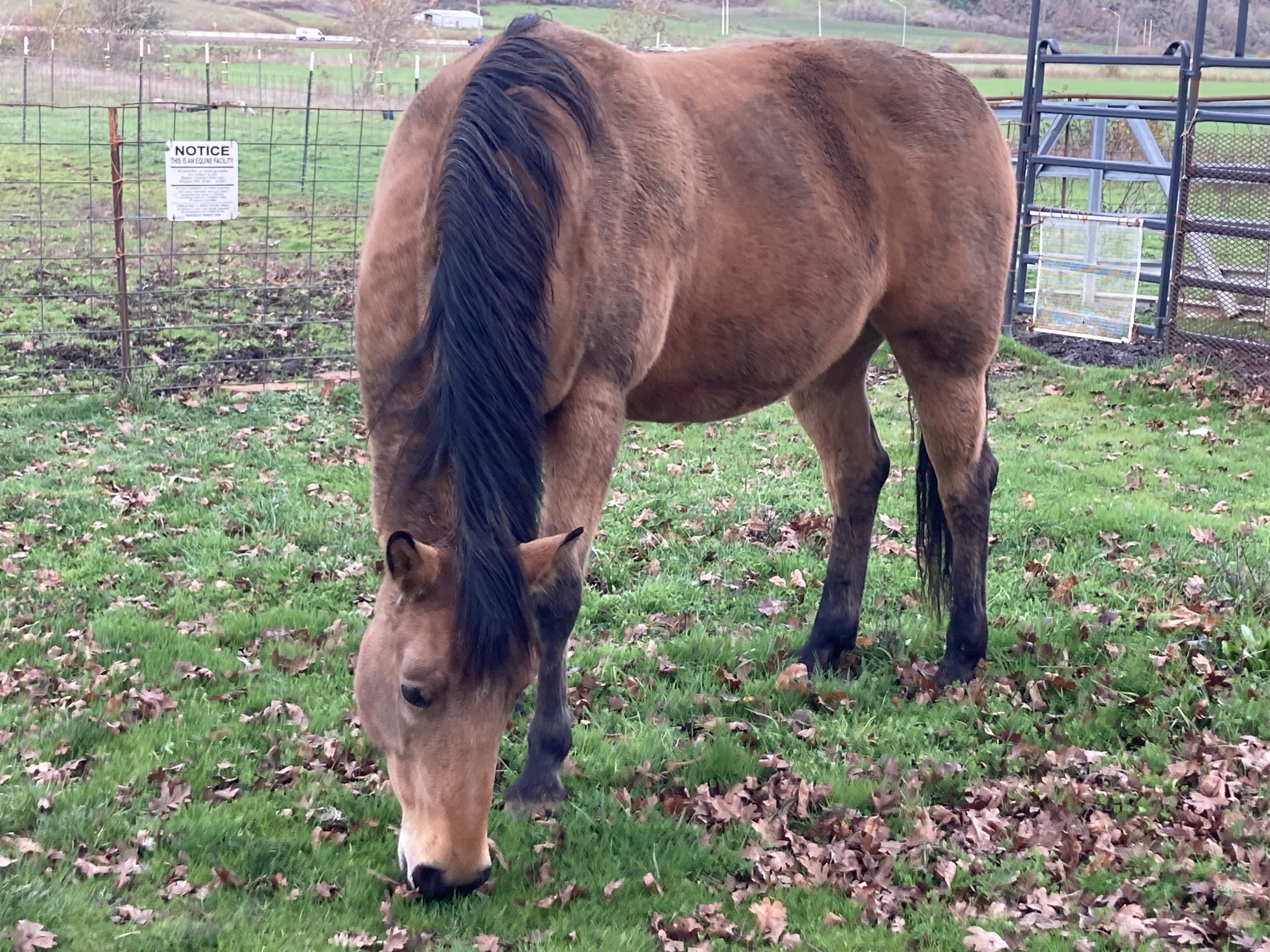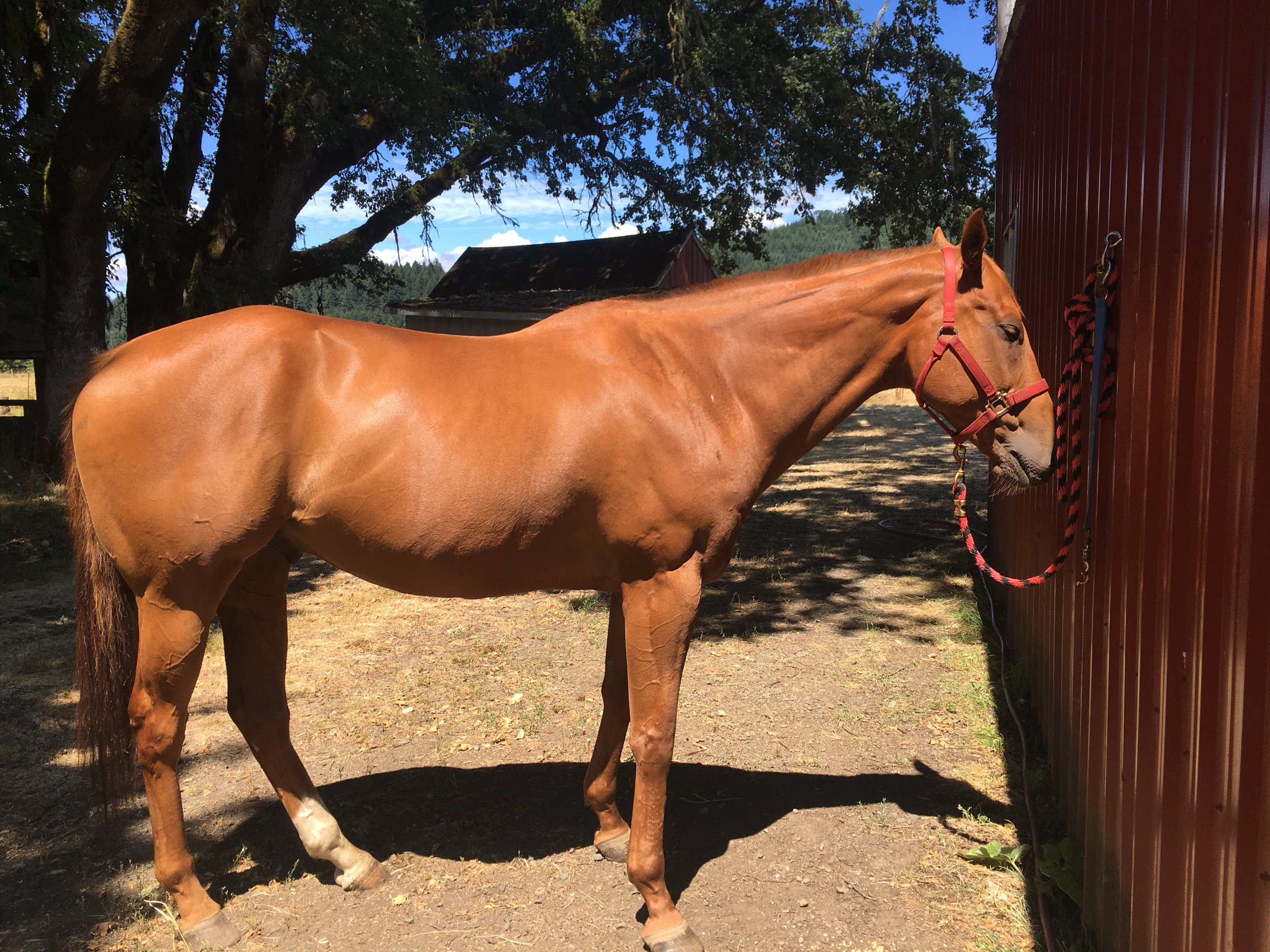Dietary and Herbal Management of Equine Ulcers
Equine Gastric Ulcer Syndrome is a serious disease affecting 50-90% of our equine friends. Racehorses and show horses are especially susceptible. In fact, according to some studies, 99% of racehorses will develop ulcers over the course of their lifetime due to stress. Ulcers are lesions in the digestive system and are extremely painful. Despite the pain, many ulcers in horses are asymptomatic or have general symptoms that are hard to diagnose. Poor coat health, poor eating habits, sensitivity to being brushed, diarrhea, and even cribbing are all symptoms of equine ulcers. All of those are also symptoms of a host of other problems or simply just bad stable vices.
The only way to officially diagnose Equine Gastric Ulcer Syndrome with certainty is to use gastroscopy. In this procedure, a horse is sedated, and a licensed veterinarian will use a camera to insert in the horse’s esophagus to inspect the digestive tract. This procedure is costly and is not available in all areas. There is a shortage of equine veterinarians in America and not all vets have the available equipment. Veterinary treatment of ulcers is also expensive. A typical treatment of prescription Omeprazole costs $350-$500 and there is no guarantee that the ulcers will not return. Over the counter treatment is also expensive. UlcerGard is currently $41 for a single dose on SmartPak with a recommended dose of two tubes. UlcerGard is a preventative and not a treatment. It is often used before a horse show or race.
There is good news on the ulcer front. Diet change and herbs can go a long way in treating and preventing ulcers. There are multiple courses of action to take that will do no harm to the horse if ulcers are not the problem. You should always follow the recommendations and discuss options with your veterinarian. However, the options listed below are non-invasive, will do no harm, and can greatly benefit the horse’s over-all wellbeing in general.
Diet Changes
It is widely recognized that high sugar grain can both cause and aggravate equine ulcers. This includes most performance horse feed such as Purina Omolene as well as prepared grain such as Wet COB. Wet COB is corn, oats, and barley coated in molasses. The first line of defense against ulcers is to feed low sugar grain. Multiple alternatives exist to help with all horses from performance to pasture pets. The base of your horse’s nutrition should come from pasture or hay and supplementation is only needed to provide what your hay is missing. Many people over supplement their horses.
There are vitamin and mineral mixes that can be added to oats, timothy pellets, or alfalfa pellets. Be sure to feed a vitamin and mineral mix based on the soil deficiencies in your area. Amino acids can also be added. Aminos are especially helpful for racehorses and sport horses who need the added support which can be hard to find without a performance feed. Purina SuperSport and Ukele Tri-Amino are two examples of amino supplements for the sport horse. I am not recommending Purina; it is just a national brand that is accessible for most equine owners.
Feeding a diet of a minimum 50% alfalfa can also help reduce and treat ulcers due to the high calcium content of alfalfa. This comes from the recommendation of my own veterinarian. My retired racehorse thrived when fed alfalfa even though he was no longer racing. Calcium is a natural acid reducer and is the main ingredient in human over the counter antacids. Reducing stomach acid can reduce ulcers.
Bart the Barrister, stable name Sergeant, enjoying the muddy retired life of a former racehorse. He was underweight and ulcer prone after his 49 race starts. A careful diet full of alfalfa, hay, supplements, and herbs eased his cribbing and improved his demeaner. He gained a much needed 250 pounds after retirement.
Ponies, overweight horses, quarter horses, and draft breeds can be prone to metabolic syndrome. It is especially important to not feed these horses high sugar grains. Alfalfa should also be limited or excluded. Ration balancers are high protein feed designed to supplement hay or pasture. They are especially useful to ensure that overweight horses do not get excess calories or sugar but get the nutrition they need. I refer to the Triple Crown Balancer as “fat mare chow” and it has done wonders for my pasture fed mustang mare’s waistline.
Some horse breeds are prone to being overweight and having metabolic issues. Ration balancers are an excellent choice for these horses.
Herbs for Equine Ulcers
There are several herbs to utilize to help equine ulcers. Slippery Elm is the number one herb to add to your horse’s diet to help treat ulcers due to its incredible power to heal the digestive tract. Many people also use Aloe Vera extract or juice and add it their horse’s grain. Chamomile, Lavandar. and Mugwort are three stress relieving herbs that can also be helpful. Please note that all following dosages are for a standard size horse weighing 1,000 pounds.
Why is Slippery Elm the number one herb to use for equine ulcers? Slippery Elm has a high mucilage content. You can feel this when you get the herb wet, it turns gelatinous. This coats the lining of the stomach providing a healing barrier. Slippery Elm also causes mucus secretion. Simply, it soothes and protects the linings of the digestive tract allowing healing to occur.
Slippery Elm is actually the dried and ground inner bark of the Slippery Elm tree. Unfortunately, due to its popularity, native stands are becoming endangered/threatened due to over harvesting. Because of this, Slippery Elm should not be used for long term use. Only use Slippery Elm during the acute phase of ulcer healing and for flare-ups. The equine dose is 1/3 cup daily for 4 months. Slippery Elm will also help equine colitis. Colitis, or large intestine and rectal inflammation, is a potentially life-threatening disease that causes severe diarrhea in horses. The most common prescription equine painkiller Phenylbutazone, or Bute, is a common cause of colitis.
Chancellor, a colitis prone horse with metabolic issues.
Aloe Vera extract or juice also acts to coat the digestive tract and can be used after the initial treatment or instead of Slippery Elm. Aloe Vera is very soothing in many applications and not just for soothing the digestive tract. Aloe is what many people put on their sunburns to soothe the pain. Aloe Vera is sustainable and readily available in most areas. Many feed stores carry Aloe extract or juice in one-gallon containers. The typical dosage of Aloe vera extract or juice for horses is 4 ounces although read the instructions on the container because the concentration of Aloe Vera varies per manufacturer and higher doses may be needed. Aloe Vera tends to be underdosed. Make sure the Aloe Vera is suitable for internal ingestion because the Aloe Vera used for topical applications may not be suitable for ingesting.
Herbs for Equine Stress Relief
Ulcers in horses are not always diet linked. Just like humans, equine ulcers can be caused by stress. This is why racehorses and show horses are so prone to ulcers. Stalled horses also have a higher ulcer risk than horses who live in pasture with mates. Any herb that can help provide natural stress relief can help prevent ulcers.
Turnout with pasture mates can go a long way in helping relieve stress in horses.
Chamomile is well known for calming. It also helps aid in digestion. It is so good at calming, in fact, that is a banned substance in both the USEF (United States Equestrian Federation) and the FEI (Fédération Equestre Internationale), or the international horse sport governing agency. When adding calming herbs to a show horse’s diet, do the research on if it is a banned substance. Not all banned substances are harmful. The dose of chamomile for horses can be up to 1/2 cup daily. Chamomile powder is also available.
Lavender is another calming herb that is banned for equine show horses. Lavender is well known for reducing anxiety. For horses, Lavender oil is most often used rather than feeding flowers. Although I have seen my mare eating my Lavander plants! A diluted oil blend of 2% Lavandar essential oil can be rubbed on the horse to help ease anxiety.
Mugwort is a nervine that can also be used in reducing equine stress, although it is not to be used in pregnant mares. Mugwort acts as a digestive bitter as well, further helping ulcer prone horses. This is very unscientific, but multiple sources claim that Mugwort is the nervine herb to use for nervous chestnut or sorrel horses, the “hot” red heads of the horse world. Dose is 15-20 g daily, or 1/2-3/4 ounce.
Stereotypical “hot” fiery red ulcer prone horse. Not all chestnuts are hot heads. Not all hot horses are red. But Sergeant is not here to prove the stereotype wrong. It should be noted he comes from Halo bloodlines. Halo horses are known for hotness no matter their color.
Equine ulcers can be managed and even healed without expensive prescription drugs. Changes in your horse’s diet or adding herbs to feed can go a long way to help your ulcer prone friend. Good luck everyone, it’s a common problem and we at Mossygoat Farm wish you success! As always, feel free to email with any further questions.
Sources:
Kimberly Fulmer has over 30 years of experience in the equine world and is a former professional. She has competed in combined training, jumpers, and dressage. She has specialized in the training and care of English sport horses. She has personally healed equine ulcers using all the methods listed above. The advice is also veterinarian backed but please consult your veterinarian before starting your horse on any herbal protocol.
Equine Gastric Ulcer Syndrome | School of Veterinary Medicine (ucdavis.edu)
Acute Colitis in Horses - PMC (nih.gov)
The Magic Elixir for Nervous Horses! (horsezone.com.au)
Materia Medica - Honeyvale Herbs
Essential Oils and Horses - Everyday Essentials (planttherapy.com)
4 Calming Herbs to Support Your Horse (Natural) – Silver Lining Herbs
Ulcers in Horses - Natural Remedies,Treatments, Signs Symptoms & Feed (earthsongranch.com)








